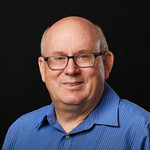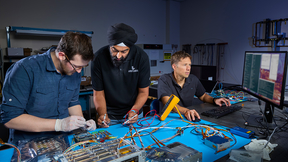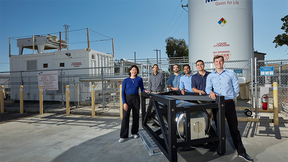Lab partners with new Space Force Lab
LLNL subject matter experts for the Space Systems Command’s Newest Tools Applications and Processing (TAP) Space Domain Awareness (SDA) Laboratory Apollo Project are left to right: Jason Bernstein, Imene Goumiri and Luc Peterson with U.S. Space Force Major Sean Allen, the first chief of the SDA TAP Lab.
Lawrence Livermore National Laboratory subject matter experts (SMEs) have been selected by the United States Space Force to help stand up its newest Tools, Applications and Processing (TAP) laboratory dedicated to advancing military space domain awareness (SDA).
The LLNL team attended the Oct. 26 kick-off in Colorado Springs of the SDA TAP lab’s Project Apollo technology accelerator, designed with an open framework to support and encourage rapid government, industry, academic and allied collaboration.
“Project Apollo was launched to inspire collaborative problem solving of critical space-domain challenges and facilitate the transfer of technology from private industry to Space Force operators,” said Jason Bernstein, principal investigator at LLNL. “As a Federally Funded Research and Development Center partner, Livermore will perform testing and evaluation of applications Project Apollo produces to ensure their operational readiness.”
The SDA TAP Lab is a major commitment by the USSF to accelerate the adoption of applications produced by industry to fill current operational gaps.
“LLNL has been brought in on the ground floor to help determine if proposed applications are ready for deployment. We also will design challenge problems for future Project Apollo cohorts guided by the needs of the Space Force guardians. Priority is given to the needs of the National Space Defense Center (NSDC) and the organizations that organize, train and equip the NSDC like Delta 2 and Delta 15. These efforts will leverage LLNL’s unique capabilities in modeling and simulation, high-performance computing and uncertainty quantification," Bernstein said.
Almost since its creation, the USSF has partnered with Lawrence Livermore.
“Being invited to collaborate on Project Apollo was the result of the excellent work produced by dozens of individuals at the Laboratory working in LLNL’s Space Program over the last decade and reflects the growing influence of LLNL in the SDA and larger space community,” said Ben Bahney, program leader of the Laboratory’s Space Science and Security Program.
The establishment of the U.S. Space Force (USSF) in December 2019 resulted from widespread recognition that, with the growing threat of near-peer competitors in space, there was a need for a military service branch focused solely on pursing superiority in space as a warfighting domain.
The Department of Defense’s 2020 Space Strategy outlined the conditions, strategic context and approach that will enable the DoD to “compete, deter and win in a complex security environment characterized by great power competition.” The “lines of effort” detailed in the strategy include leveraging commercial technological advancements and acquisition processes and cooperating with allies, partners, industry and other U.S. government agencies.
The new TAP Lab and Project Apollo are key endeavors established to meet those objectives.
“The U.S. Space Force is new and working hard to address, invest and bring R&D into the field as quickly as possible. The objective of the TAP lab is to leap over the ‘Valley of Death’ so we can take cutting-edge technology into operations as quickly and efficiently as possible,” said Luc Peterson, associate program leader for data science in the LLNL Space Program.
“Project Apollo aims to have something ready for review in 100 days, which is incredibly fast by any S&T standard. We’re here to make sure we don’t sacrifice quality for expedience and figure out how to go fast and not break things,” Peterson added.
Lawrence Livermore has the skills and multidisciplinary expertise to evaluate and vet the applications that Project Apollo collaborators create, as well as the scientific and technical know-how to determine which projects and applications can solve the fundamental problems the guardians face.
“The Lab also has a sweet spot for all fundamentals ― data science, astrophysics, HPC, uncertainty quantification, modeling and mechanics ― that will enable Project Apollo’s success,” Bernstein said. “This is a really unique project. It’s a huge opportunity to work with industry and government partners to determine which methods and S&T the guardians use in the field.”
Project Apollo will focus on solving a variety of technical challenges, including developing capabilities to detect rocket launches using open-source seismic data, predicting the trajectory of rockets and directing a sensor, such as radar, to search and track a rocket using predictive algorithms.
The Project Apollo kick-off was attended by more than 200 individuals from private industry, University Affiliated Research Centers, Federally Funded Research and Development Centers, industry centers, USSF guardians and foreign partners such as Canadian Brigadier General Kyle Paul.
Col. Raj Agrawal, currently assigned as commander, Space Delta 2-Space Domain Awareness, spoke at the Project Apollo kick off and observed that “the world has changed. We no longer support the warfighter. We are the warfighter.”
LLNL’s Project Apollo team includes Bernstein, Imene Goumiri, Ashley Cocciadiferro, Ryan Lee and Peterson.
Organizations and individuals interested in collaborating via the TAP Lab should contact bernstein8 [at] llnl.gov (Bernstein).
Contact
 Stephen Wampler
Stephen Wampler
[email protected]
(925) 423-3107
Related Links
Tools, Applications and Processing (TAP) laboratoryU.S. Space Force (USSF)
Department of Defense’s 2020 Space Strategy
S&TR On Target for Space Security
S&TR A Lasting Impact: DART, Livermore and Planetary Defense
S&TR Lab’s space program is on the rise
Tags
Global SecurityFeatured Articles







